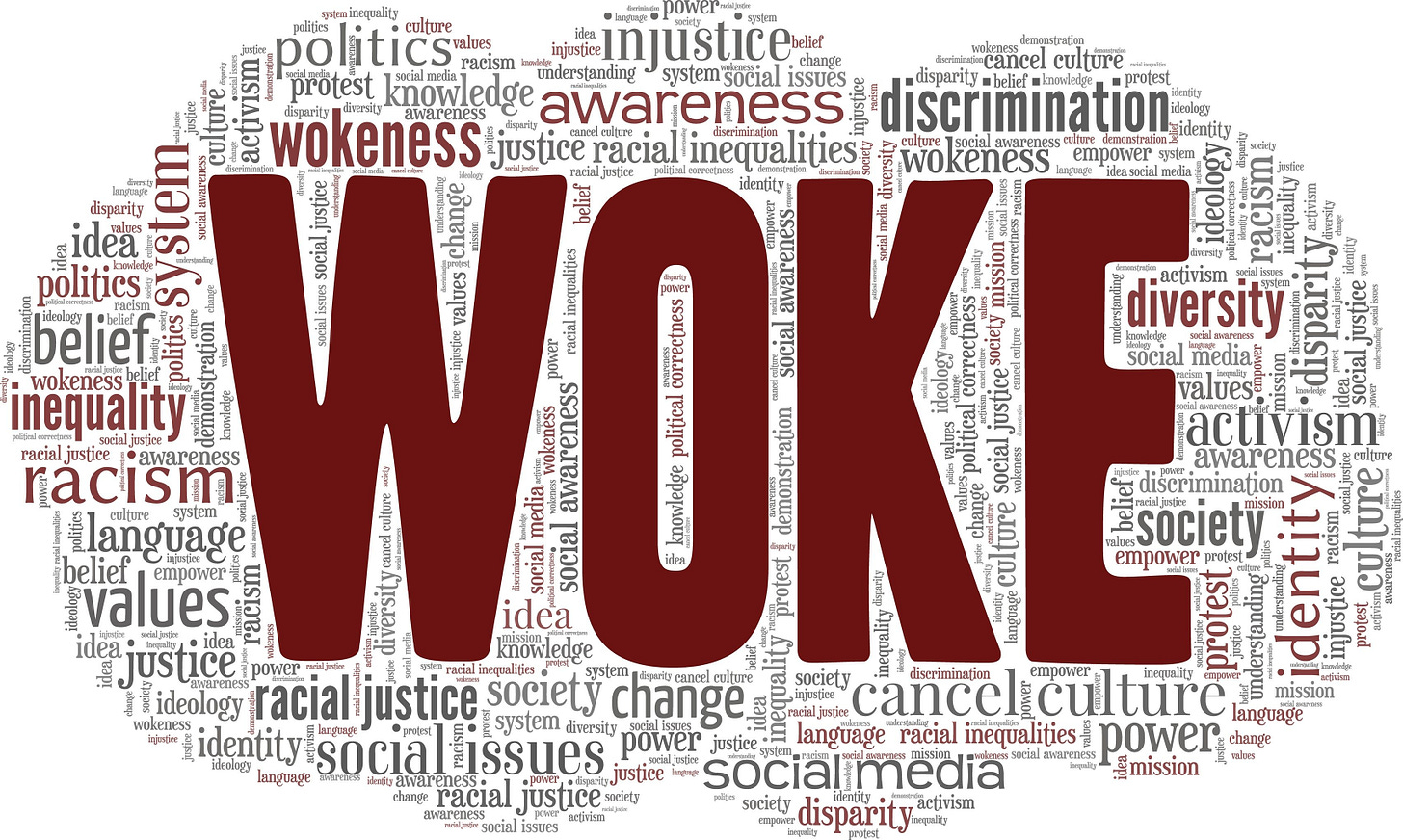E-Pluribus | September 28, 2023
Arguing well; taking "it was just a joke" too far; and a look at the book, The Origins of Woke.
A round-up of the latest and best writing and musings on the rise of illiberalism in the public discourse:
Erec Smith: In Defense of Defensive Confidence
Getting people to argue is easy. Getting people to argue well is more difficult. At Discourse Magazine, Erec Smith writes about the concept of “defensive confidence” that enables individuals to engage ideas freely and constructively rather than avoiding confrontation or simply trying to suppress information and concepts that may contradict one’s current positions.
It’s not that people are afraid of arguments; rather, they are afraid of losing arguments. Many people would rather avoid or shut down those with whom they disagree than risk being exposed as wrong in any way. Examples of this avoidance behavior abound, especially—and ironically—on college campuses, where students are supposed to be learning argumentative skills. So, we may need to reconceptualize the point of rhetorical education by not just teaching people how to argue, but also encouraging them to be open to argumentation in the first place. The key to the latter endeavor lies in the concept of defensive confidence.
According to psychologists Dolores Albarracín and Amy L. Mitchell, defensive confidence “entails people’s perceptions that they can defend their attitudes against contradictory information coming from the environment” and lies “at the heart of one’s resolution of the conflict between new information that challenges and new information that supports one’s attitudes.” People with high defensive confidence are less bothered by what Albarracín and Mitchell call “counterattitudinal” ideas—ideas that run counter to what they believe. Thus, they are more willing to engage in argumentation.
In contrast, people without defensive confidence are more apprehensive when it comes to confronting ideas contrary to their own. The thought of having their minds changed or even just complicated feels daunting. According to a series of studies done by Albarracín and Mitchell, this lack of defensive confidence can “impede stereotype reduction and generally increase defensive strategies that may be maladaptive and isolating.”
It’s clear, then: Those with defensive confidence are more open to engaging opposing viewpoints and the possibility of having their minds changed. The reason for this is simple: The more one engages with ideas contrary to one’s own, the more likely it is that one’s mind will be changed. If one avoids such confrontation, their ideas will not be affected. As the chart below shows, a variety of characteristics—both positive and negative—help to build one’s sense of defensive confidence, and that confidence makes people more open to information that could cause an attitude change.
Read the whole thing.
Kat Rosenfield: The Lies of Trauma Merchants
We all know people who revert to “I was only joking” when something they have tried to pass of as genuine is questioned. Using the case of Hasan Minhaj as a jumping off point, Kat Rosenfield writes at the Free Press about those who attempt to use trauma, real or (too often) imagined, to try to gain the upper hand in political or cultural debates.
Comedian and television personality Hasan Minhaj, an alumnus of The Daily Show, built his career on stories of the persecution he had faced as an Indian and Muslim son of immigrants in a post-9/11 America. But as outlined in a devastating report by New Yorker writer Clare Malone, his most popular material contained key omissions and barefaced lies.
The FBI informant who infiltrated Minhaj’s Muslim community and then reported his mosque to the authorities? Minhaj never met him. The hospitalization of Minhaj’s daughter after someone mailed him an envelope full of a white mystery powder that could have been anthrax? Never happened. And the high school ex-girlfriend who accepted Minhaj’s invitation to prom, only to jilt him on her doorstep for racist reasons while her new (white) date slipped a corsage on her wrist? She had actually turned down Minhaj several days earlier, and this doorstep moment—upon which Minhaj more or less built his career—was a complete fabrication.
Much like Frey, Minhaj’s popularity centered on his suffering. His work was understood to express the crude, unvarnished, and sometimes darkly funny truth of what it is like to be a brown-skinned man in a racist America: white liberal audiences treated him as a sort of mascot for the oppressed, while the culturati lauded him for speaking truth to power. Here, as Slate writer Nitish Pahwa puts it, was “an Indian Muslim, hosting his own show, taking the country to task on his terms, terms that had long been absent from the white man–dominated industries of stand-up comedy and late-night TV.”
But things are a little more complicated when the fabricator is telling tales on the stage rather than the page. It is understood that for comedians, the question of truth, as in authenticity, is something separate from what is true, as in accurate. Comedians will do anything for a laugh, lying included, and everybody knows this—even if the precise ethical boundaries of untruth are sometimes the subject of debate, including by comedians themselves.
Read it all.
Oliver Traldi: Civil Rights and Wrongs
Richard Hanania is a polarizing figure, especially since a recent exposé found him using a pseudonym to make inflammatory comments on social media. Nevertheless, his new book The Origins of Woke is being treated as a serious contribution to the current discourse on the phenomenon. At Quillette, Oliver Traldi examines Hanania arguments and research. (For Yascha Mounk’s take on the origins of woke — the term, not the book — see Around Twitter below.)
The Origins of Woke is quite well-researched and thorough, and draws on a history of American government action that is quite public but seldom discussed, since it happens in the dusty basements of the bureaucracy and not the high-ceilinged halls of Congress or the Supreme Court. But every now and then a claim goes by rather quickly that I wasn’t sure about. For instance, the book cites a statistic that Yale now has as many administrators as it does students; but this is because many employees at Yale’s hospital count as administrators for bookkeeping purposes. Hanania relates the story of Howard W. Smith, a segregationist Congressman who purportedly introduced “sex” into the Civil Rights Act of 1964 to try to derail it; the point being that its inclusion in the bill, which passed anyway, may have helped to create an enormous federal sex discrimination bureaucracy almost by accident. But as far as I can tell, many aspects of this tale are disputed by historians.
Hanania closes with a “What Is to Be Done?” chapter. His ideas there are straightforward given his analysis in the rest of the book: anti-wokes should roll back affirmative action, disparate-impact law, and anti-harassment law—for him, the essence of wokeness—by using the judicial and executive branches just like progressives used those branches to develop those things. (This has already begun with the Supreme Court’s anti-affirmative-action ruling in Students for Fair Admissions v. Harvard.) The chapter goes into quite a bit of detail about just which things should be overturned, which I suspect many readers will find interesting. Overall, Hanania’s proposals make a lot of sense for the anti-woke movement, especially for anti-woke conservatives and libertarians who are bound to be on board with most of the intellectual backdrop and assumptions of the book. It is again a helpful salve for a movement, the practical proposals of which often involve things like trying to convince people to take disagreement more seriously and trying to teach people about John Stuart Mill (I’m guilty of taking these kinds of approaches myself).
Though it is in many ways a darker and more provocative work than other anti-woke books, The Origins of Woke is ultimately perhaps a little too optimistic. Having offered a causal analysis of wokeness as a phenomenon that emerged from judicial and administrative innovations, and from interpretations of civil-rights law, Hanania seems to assume that rolling back those innovations and interpretations will achieve a resounding victory over wokeness. Well, of course, such a development would be a victory of sorts. But even if we accept that the culture of wokeness may have, as Hanania argues, been produced by a specific legal and political situation, it does not follow that changing this situation will change the culture. Removing the cause does not necessarily remove the effects it’s already had.
Read it all here.
Around Twitter (X)
Here are just the first three tweets and one other from a very long thread from Yascha Mounk on the origins of “woke”. Click for it all.
Steven Pinker went on Piers Morgan's TV show "Uncensored” to talk about gloom and doom media, free speech and, yes, human progress. Click for the video.
And finally, hard to make the argument that public schools are not indoctrinating kids on gender when something like this appears in the hallway:










